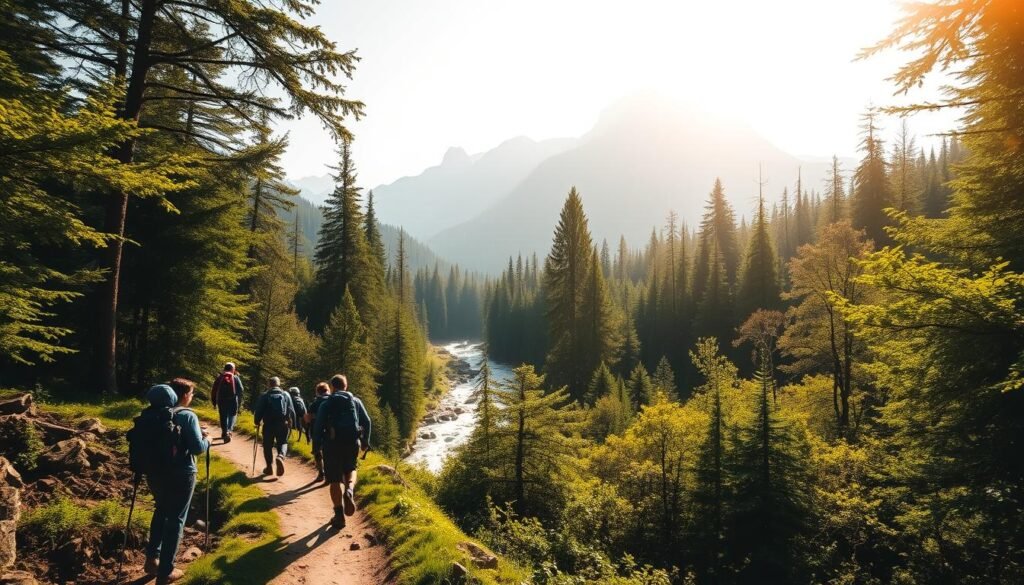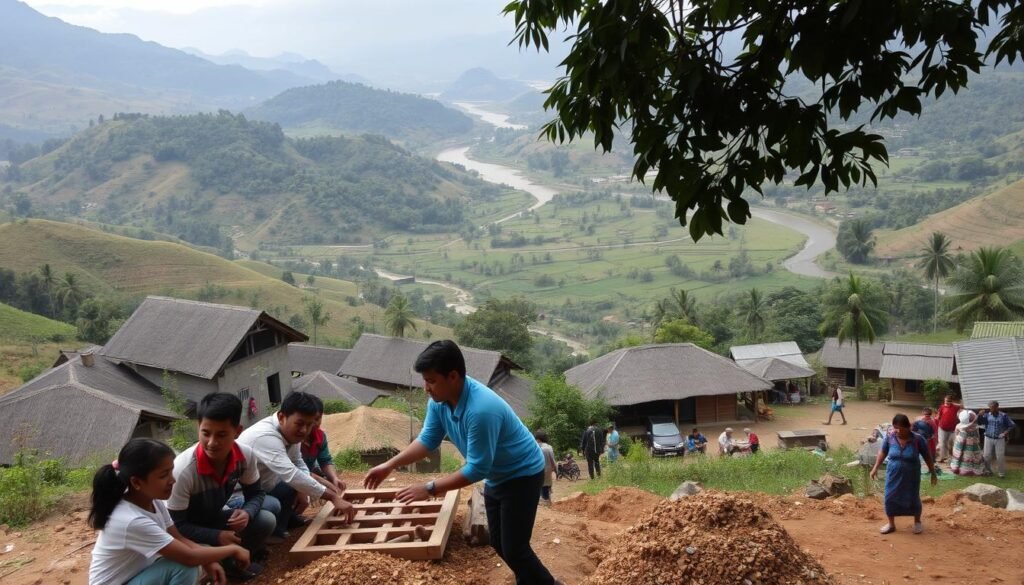When we travel, it’s key to think about how our travel choices affect the environment and local people. The idea of sustainable tourism is becoming more popular. It encourages us to travel in ways that don’t harm the planet.
Choosing ethical travel experiences helps protect nature, supports local businesses, and keeps cultural traditions alive. This way of traveling not only helps the places we visit but also makes our trips more meaningful.
Key Takeaways
- Adopting responsible travel practices minimizes negative environmental impacts.
- Sustainable tourism supports local communities and preserves cultural heritage.
- Ethical travel experiences promote a more equitable tourism industry.
- Travelers can make a positive impact by choosing eco-friendly accommodations.
- Responsible travel stories inspire others to explore the world sustainably.
The Importance of Responsible Travel
As the world gets more connected, the need for responsible travel grows. Global tourism’s rise has put a spotlight on its effects on local places and people.
Understanding Sustainable Tourism
Sustainable tourism means traveling in a way that doesn’t harm the environment, culture, or society. It’s about reducing waste, saving natural resources, and respecting local ways of life.
“Sustainable tourism is about making a positive impact on the places we visit, leaving them in the same, if not better, condition than when we arrived,” as emphasized by the Global Sustainable Tourism Council.
Benefits of Responsible Travel for Communities
Responsible travel helps local communities a lot. It supports local businesses and economies, helping with community development and keeping cultural heritage alive. It also helps protect our environment for the future.
- Supporting local economies through responsible spending
- Promoting cultural exchange and understanding
- Encouraging environmental conservation efforts
By choosing responsible travel, we can really make a difference. A study found that community-based tourism can boost local income by up to 20% in some areas.
Inspiring Responsibly Traveled Destinations
The world is full of amazing places that are not only beautiful but also care about the planet. As we travel, it’s great to see places focusing on being green and reducing harm to the environment.
Eco-Friendly Resorts You Must Visit
For those looking for eco-friendly journeys, there are many resorts worldwide that stand out. These places are not just fancy; they also care deeply about the planet.
- Resorts using renewable energy sources like solar and wind power.
- Properties that have implemented significant waste reduction programs.
- Resorts that support local communities through various initiatives.
In Costa Rica, there’s a resort that’s a top example of sustainable tourism. It uses solar energy and has a strong recycling program. A traveler said, “Staying here was more than a vacation; it was a lesson in living green.”
“The future of travel is not just about seeing new places, but also about preserving them for generations to come.”
Cities Leading the Way in Sustainability
Cities globally are also getting greener, making them great for ethical travel experiences. They’re introducing green transport and new ways to handle waste. These cities are setting high standards.
Copenhagen is known for aiming to be carbon neutral by 2025. It’s a leader in green living, with lots of cycling paths, green roofs, and eco-friendly transport.
As we explore and share about these places, we see the impact of responsible travel. By choosing to visit places that care for the planet, we help make the world a greener place.
Engaging with Local Cultures and Communities
Traveling is rewarding when you connect with local communities. You learn about their lives and support their growth. This builds understanding and helps communities thrive.
It’s more than just seeing tourist spots. It’s about diving into the local culture. Community-based tourism lets you join in and help the local economy.
Volunteering Opportunities While Traveling
Volunteering abroad is a great way to connect with locals. You can teach kids or help with community projects. It’s a chance to understand their culture and help them.
For example, teaching English or helping in a garden is rewarding. You make a difference and learn about the culture.
Tips for Authentic Cultural Experiences
To truly experience a culture, be open and respectful. Here are some tips:
- Learn a few basic phrases in the local language to show respect.
- Participate in local festivals and events to experience the culture firsthand.
- Support local businesses and artisans by purchasing their products.
By following these tips, you can have a real cultural experience. It supports conscious travel storytelling and socially conscious travel.
Connecting with local cultures is key to responsible travel. It makes your trip richer and helps preserve cultural heritage and support local communities.
Eco-Travel: Adventures with a Conscience
Eco-travel is changing the tourism world. It focuses on ethical wildlife encounters and supports conservation. This way of traveling lets people see new places and help the environment.
Choosing eco-friendly journeys means seeing nature’s beauty. It also helps local communities and conservation. Environmental conservation adventures are great for connecting with nature and promoting green living.
Nature Reserves That Welcome Eco-Tourists
Nature reserves worldwide are now open to eco-tourists. They offer a chance to see different ecosystems and help conservation. These places are homes to many plants and animals, and visiting them helps protect them.
Some famous nature reserves for eco-tourists are:
- The Amazon Rainforest in South America, known for its lush vegetation and diverse wildlife.
- The Maasai Mara National Reserve in Kenya, famous for its annual wildebeest migration.
- The Galapagos Islands in Ecuador, a unique ecosystem with a variety of endemic species.
Wildlife Tours That Support Conservation
Wildlife tours that support conservation are key in eco-travel. They let people see animals in their natural homes. They also help protect these animals and their places.
Examples of wildlife tours that support conservation include:
| Tour | Location | Conservation Focus |
|---|---|---|
| Safari Tours | Africa | Protection of big cats and their habitats |
| Whale Watching | Global | Marine conservation and research |
| Bird Watching Tours | Various | Habitat preservation for bird species |
By joining these eco-friendly adventures, travelers can help the environment. They also support conservation efforts all over the world.
Reducing Your Carbon Footprint While Traveling
Traveling in an eco-friendly way is key to lessening our carbon footprint. By adopting sustainable habits, we help the planet and make our trips better.
Tips for Greener Travel Choices
To travel more sustainably, consider these tips:
- Opt for public transportation, walk, or bike whenever possible.
- Choose accommodations that have implemented sustainable practices, such as energy-efficient lighting and waste reduction programs.
- Reduce energy consumption by turning off lights, air conditioning, and heating when not in use.
- Support local economies by purchasing goods and services from local providers.
By making these simple changes, travelers can significantly reduce their environmental impact. For instance, choosing direct flights can reduce carbon emissions associated with air travel, and packing light can decrease fuel consumption.
The Impact of Climate-Conscious Travel
Climate-conscious travel benefits the environment and makes travel better. By supporting eco-friendly tour operators and local businesses, travelers help protect natural habitats and cultural sites.
Key benefits of climate-conscious travel include:
- Preservation of natural environments and biodiversity.
- Support for local communities through sustainable tourism practices.
- Promotion of cultural heritage conservation.
As we move forward, embracing sustainable tourism practices will be key in fighting climate change. By making informed choices, travelers can protect the planet for future generations.
Responsible Adventure Activities
More people are looking for ethical travel experiences. They want to explore without harming the environment or local communities. This shift is driven by a growing awareness of the world’s interconnectedness.
Choosing Ethical Tour Operators
Choosing the right tour operator is key. Look for those who focus on environmental conservation and community well-being. These operators make sure their activities are fun and also help protect nature and support local economies.
- Research the operator’s commitment to sustainability.
- Look for certifications or awards that recognize their environmental efforts.
- Read reviews from other travelers to understand their ethical practices.

Safety and Sustainability in Outdoor Activities
Safety and sustainability are important in outdoor adventures. Operators who focus on safety protocols and sustainable practices reduce tourism’s environmental impact. They also make sure everyone stays safe during their adventures.
Some important things to consider include:
- Following local regulations and guidelines.
- Using waste reduction and management strategies.
- Teaching respect for wildlife and natural habitats.
By picking tour operators that follow these guidelines, travelers can have fun adventures. They also support environmental conservation adventures and help local communities thrive.
Responsible Eating While Traveling
Eating responsibly is key to conscious travel. It lets us enjoy local tastes while helping local farmers and markets. Choosing local food helps the economy and cuts down on waste.
Locally Sourced Cuisine You Can’t Miss
Trying local food is a treat for your taste buds and supports local tourism. These dishes use fresh, seasonal items from nearby farms and markets.
Some dishes you should try include:
- Fresh seafood in coastal towns
- Farm-to-table produce in rural areas
- Street food that showcases local culinary traditions
Food critic Michael Pollan says, “Eat food, not too much, mostly plants.” This advice fits well with eating responsibly while traveling.
“The food you eat can be a powerful tool for change, supporting local economies and sustainable agriculture.”
How to Support Local Farmers and Markets
Helping local farmers and markets is important for socially conscious travel. Here are ways to do it:
- Visit local farmers’ markets to buy fresh produce and handmade goods.
- Eat at restaurants that use local ingredients.
- Talk to local food makers and learn about their work.
| Benefits | Actions |
|---|---|
| Boosts Local Economy | Purchase local products |
| Promotes Sustainable Agriculture | Choose restaurants with locally sourced ingredients |
| Enhances Cultural Experience | Engage with local food producers |
By following these steps, travelers can make a difference. They help tell stories of conscious travel, leaving a positive mark on the places they visit.
Traveling with Purpose: Philanthropic Journeys
More people are now traveling with a purpose. They want to make a difference in the places they visit. This new trend is all about giving back and exploring.

Combining Travel with Social Impact Initiatives
Travelers can now explore and help at the same time. They choose tours that support local communities. This way, they help with projects like education and conservation.
Some tours let you help with wildlife, education, or building projects. These efforts help the community and teach travelers about the place they’re in.
Stories of Change Through Philanthropic Travel
Philanthropic travel has changed lives. It has helped with schools, protected animals, and more. These stories inspire and motivate others to help.
One example is a community that got a better school thanks to travelers. Such stories show how travel can make a big difference.
Traveling responsibly is about more than just seeing new places. It’s about making connections and appreciating different cultures and communities.
Inspiring Responsible Travel Stories from Travelers
Stories of responsible travel are becoming more common. They inspire others to travel in a way that’s good for the planet. As more people think about their impact, it’s important to share the good things about traveling responsibly.
Real Experiences Shared by Traveling Enthuasiasts
Travelers are sharing their real stories. They talk about the benefits of traveling in a way that’s kind to the environment. This includes staying in places that are good for the planet and helping out in local communities.
For example, someone might tell about volunteering at a wildlife project. They’ll talk about how it helps the environment and the people nearby. These stories teach us why it’s important to travel responsibly.
Interviews with Responsible Travelers
We’ve talked to travelers who choose to travel in a way that’s good for the planet. They share their experiences and tips for traveling responsibly.
| Traveler | Destination | Responsible Travel Practice |
|---|---|---|
| Emily Wilson | Costa Rica | Stayed in an eco-lodge, supported local conservation efforts |
| Mark Davis | New Zealand | Participated in a Maori cultural immersion program, supported local artisans |
| Sophia Lee | Thailand | Volunteered at a local community center, chose sustainable tour operators |
These interviews show different ways to make a positive difference. We hope their stories will encourage others to travel responsibly too.
Key Takeaways: Responsible travel means making choices that help the environment and local communities. By sharing stories and tips, we can get more people to travel in a sustainable way.
The future of travel is about exploring new places in a way that’s good for the planet.
Building a Community Around Responsible Travel
As travelers, we can shape the future of tourism. We can do this by building a community focused on responsible travel. This effort promotes sustainable travel, supports local communities, and encourages conscious travel storytelling.
Online Platforms for Sharing Sustainable Travel Tips
Online platforms have made it easier to share travel tips. Websites and social media groups focused on responsible travel are great resources. They help travelers make a positive impact.
These platforms let travelers exchange ideas and stories. They learn from each other’s experiences. This way, they contribute to a growing responsible travel culture.
Key Features of Effective Online Platforms:
- Discussion forums for sharing tips and experiences
- Resource sections for guides on sustainable travel
- Event calendars for community meetups and webinars
How to Connect with Like-Minded Travelers
Connecting with others who share your values is key. It makes your travel experiences better and helps the cause. You join a larger movement.
| Methods | Benefits | Examples |
|---|---|---|
| Join online forums and social media groups | Access to a wealth of information and experiences | Facebook groups, Reddit forums |
| Attend community events and meetups | Opportunities to network and learn from others | Local travel meetups, sustainability conferences |
| Participate in community-based tourism initiatives | Direct involvement in local communities and sustainable projects | Volunteer programs, eco-tourism projects |
By using these methods, travelers can find others who care about responsible travel. This builds a community and encourages cooperation.
The Future of Responsible Travel
The world is getting more connected, and responsible travel’s future looks bright. Innovations in sustainable tourism are key. Many tour operators and places are now focusing on being green.
Innovations in Sustainable Tourism
New tech and practices are helping make travel more sustainable. Eco-friendly hotels, green transport, and wildlife tours are on the rise. These changes are vital for the future of travel.
Advocating for Change
Travelers can make a big difference by choosing wisely. Supporting eco-friendly tours and places helps the industry grow greener. Sharing our experiences can also encourage others to travel responsibly.
Together, we can make travel better for our planet. The future of travel is looking good. It’s up to all of us to make it happen.

















Leave a Reply